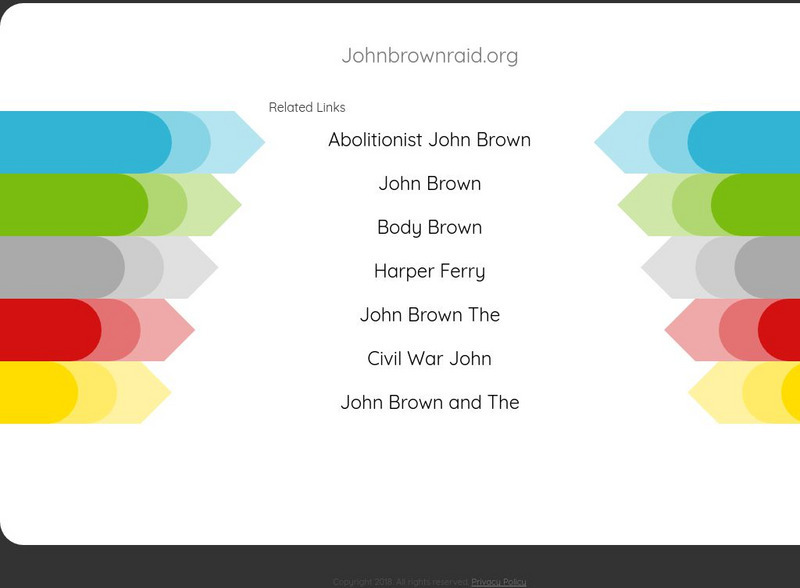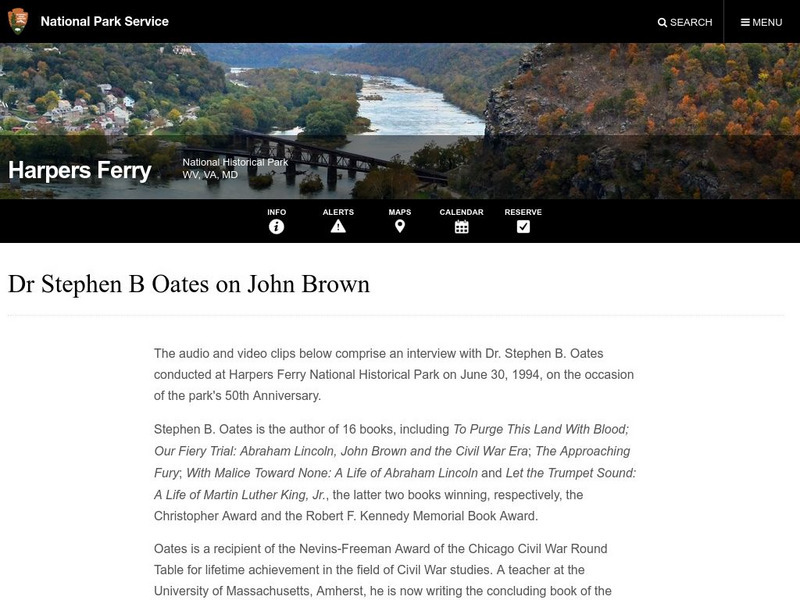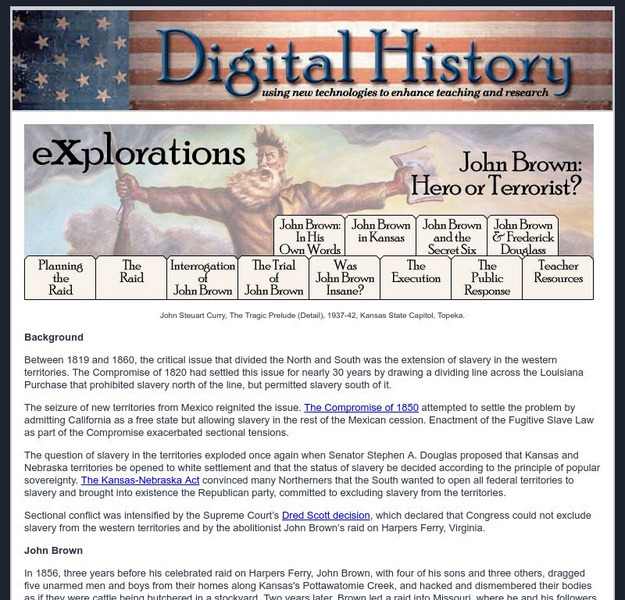Curated OER
Slavery and Abolition: Three Unforgettable Names
Students research the people and events involved in the abolitionist movement prior to the U.S. Civil War. They read about and discuss the roles of Nat Turner, Harriet Tubman, and John Brown. Students complete a word splash, Venn...
Curated OER
Abolishing Slavery
Students explain the goals and methods of the abolitionist movement.
They identify key leaders in the movement. This lesson has adaptations for elementary through high school. Links are provided for resource readings.
Curated OER
John Brown, Then and Now
Eleventh graders study one of the selected images of John Brown and read an excerpt online that describes his role in the Civil War. They identify significant information about John Brown. They think about how this applies to current...
PBS
Pbs: Cet: Africans in America: The Raid on Harper's Ferry
PBS' four-part series, "Africans in America," highlights the antislavery movement, including a focus on John Brown's Raid on Harpers Ferry. Content includes a description of the event, as well as the after-effects including the news of...
Digital Public Library of America
Dpla: John Brown's Raid on Harper's Ferry
This collection uses primary sources to document John Brown's raid on Harper's Ferry and the broad range of responses it provoked across the country. Includes a teaching guide.
University of Missouri
Famous Trials: Trial of John Brown: Lee's Report on the Attack at Harper's Ferry
The text of the message Robert E. Lee sent to his adjutant general on Oct. 19, 1859 concerning his men's actions in response to John Brown's raid on Harpers Ferry.
Other
John Brown Raid: 1859 Raid on Harpers Ferry
Commemorating John Brown's historic Harpers Ferry raid of 1859, this site has lots of information about Brown and the raid. The Educational Resources page is helpful for lesson materials. The links on the pressroom page will help you...
Virginia Historical Society
Virginia Historical Society: The Portent: John Brown's Raid in American Memory
Online companion of an exhibition mounted in 2009 to commemorate the anniversary of John Brown's raid on Harpers Ferry examines Brown's role as a catalyst of the American Civil War.
Digital History
Digital History: Harper's Ferry
Read about the infamous raid on Harper's Ferry by John Brown and his band in 1859. His first plan had a chance of success thought Frederick Douglass, but the plan that was carried out was doomed from the start. See what John Brown was...
Henry J. Sage
Sage American History: John Brown at Harper's Ferry
Article on John Brown's raid on the federal arsenal at Harper's Ferry including excerpts from the U.S. Senate report on the case as well as John Brown's last speech and letter.
Siteseen
Siteseen: American Historama: John Brown's Raid on Harpers Ferry
Interest facts about John Brown, the militant anti-slavery activist who tried to seize ammunition from an armory at Harpers Ferry in 1859.
University of Virginia
John Brown and the Valley of the Shadow: The Conspirators' Biographies
Find out about the men who joined John Brown in his raid on Harpers Ferry. The biographies are brief but informative. Click on the highlighted names for more information about them.
Library of Virginia
Death or Liberty: John Brown's Raid
The Library of Virginia details John Brown's Raid on Harper's Ferry as a prelude to the U.S. Civil War. Content also lists various records and resources regarding John Brown's Raid held in the library.
Digital History
Digital History: John Brown at Harper's Ferry [Pdf]
Find out about the influences in John Brown's life that led him to think inciting a slave insurrection would be the way to get rid of slavery. Read about his actions in Kansas, and the raid he planned at Harper's Ferry. [pdf]
Other
Ny History Net: The "Black Dream" of Gerrit Smith, New York Abolitionist
This site talks about the life of abolitionist Gerrit Smith, who was convicted in the John Brown Raid on Harpers Ferry but maintained innocence in any involvement in planning the raid.
Curated OER
National Park Service: Dr. Stephen Oates on John Brown
This site presents audio and video clips of an interview with Dr. Stephen B. Oates conducted at Harpers Ferry National Historic Park on June 30, 1994. Dr. Oates comments on John Brown's impact upon the nation with regard to the slavery...
OpenStax
Open Stax: John Brown and the Election of 1860
By reading this section from a chapter on " The Tumultuous 1850s," students will be able to describe John Brown's raid on Harpers Ferry and analyze the results of the election of 1860.
Independence Hall Association
U.s. History: John Brown's Raid
John Brown was considered a madman by many and a martyr by others. Read about his ill-fated raid on the federal arsenal at Harper's Ferry, Virginia. Why did this raid cause such a reaction in the Southern states?
Ducksters
Ducksters: Quiz: Harpers Ferry and John Brown for Kids
History Questions: Harpers Ferry and John Brown Quiz, Test, and WebQuest
Stanford University
Beyond the Bubble: John Brown's Legacy
[Free Registration/Login Required] Students answer questions about a poster for a play written in 1936 that celebrates the abolitionist John Brown, who tried to start a slave revolt in Harpers Ferry, Virginia, in 1859.
Digital History
Digital History: Explorations: John Brown: Hero or Terrorist?
Comprehensive account explores John Brown, the Attack at Harper's Ferry, and his trial. You decide if he was a hero or a terrorist.
University of Groningen
American History: Outlines: Lincoln, Douglas and Brown
Overview of events of a nation in conflict including the 1858 U.S. Senate race between Abraham Lincoln and Stephen Douglas and the attack on Harpers Ferry.
Library of Congress
Loc: The Champions of Human Liberty
Frederick Douglass gave as speech praising John Brown and his raid on Harper's Ferry. He viewed Brown as a real hero of the abolitionist cause. Read his speech or listen to an excerpt.
The History Place
The History Place: Great Speeches: William Lloyd Garrison on Death of John Brown
A speech delivered by William Lloyd Garrison after John Brown was hanged for leading the slave rebellion at Harpers Ferry in 1859. In his speech, Garrison advocates for taking a stand against slavery by seceding the North from the South.























